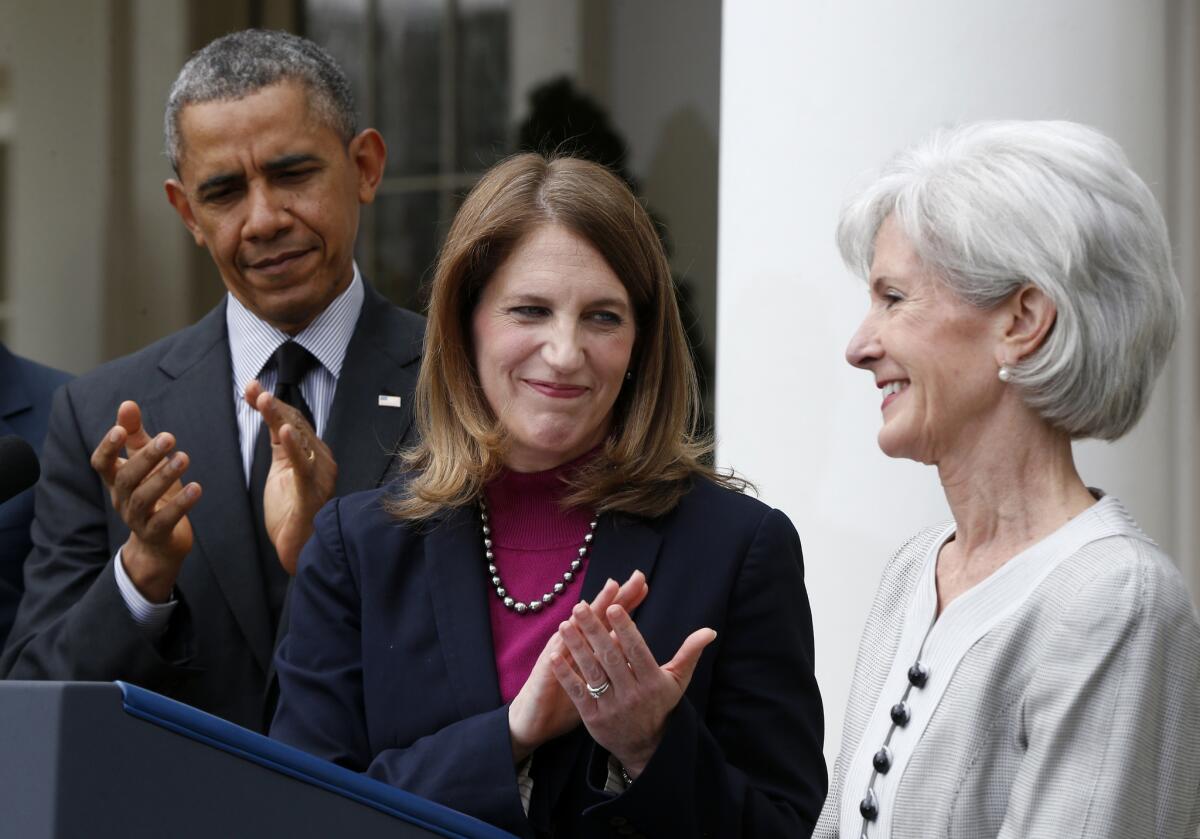Found: The lamest anti-Obamacare column of all (thus far)

As we’ve recently observed, conservative opponents of the Affordable Care Act have pulled out the stops to paint the law as an unmitigated disaster--notwithstanding its documented gains in health insurance coverage for millions of Americans nationwide.
But we think we’ve found the dopiest entry in this competitive field. Tip your hat to Michael F. Cannon of the libertarian Cato Institute, who wins the prize with a piece entitled “ACA Exchanges at risk.” Cannon is director of health policy studies at Cato, which is a little scary. His column appeared April 22 on the opinion page of the Los Angeles Register (whatever that is) and also is published on the Cato website.
Its theme is that Obamacare “creates so many incentives for enrollees to drop their coverage” that this year’s enrollment numbers can’t be sustained. The piece goes even further, stating that people are financially better off if they drop their coverage and “wait until they get sick to re-enroll.”
That argument places Cannon squarely in the disreputable camp of conservatives who advise Americans not to sign up for Obamacare because there’s no downside to going without coverage. That was the implicit point made recently by the right-wing blogger Matt Drudge, who says he’ll never sign up for Obamacare and claimed (implausibly) that he had already paid his 2014 penalty for shunning the ACA’s legally mandated individual health coverage.
It should be obvious that advising anyone to go without health insurance, especially when it’s been made affordable by the ACA, is the height of irresponsibility. That’s even more true when the advice is based on nonsense.
So let’s take a gander at where Cannon, Cato’s health policy expert, goes off the rails.
First, he claims that “for most healthy people, going uninsured before Obamacare, at least for a time, was already a safe bet.... The odds that they would have to deal with unmet medical needs, or unpaid medical bills, were low.”
That’s true, up to a point. Of course the flaw in this reasoning is that the time span dividing healthfulness from dire medical need can be a nanosecond--the time it takes to be hit by a car, feel a sudden chest pain, or to take a phone call from a doctor bearing a cancer diagnosis. You want to roll the dice, go ahead. Just remember that you are rolling the dice.
Then Cannon gets really ghoulish. “Suppose the day after you cancel your health insurance, you receive a serious diagnosis like diabetes, or cancer,” he posits. No problem! Under Obamacare, you can’t be denied insurance coverage or charged extra for that illness!
On the other hand, Cannon concedes, you may have to wait until open enrollment for the following year to sign up, which means your coverage won’t start until next January.
Big deal, Cannon suggests. What’s the risk that you’ll have to wait, say, 11 months to see a doctor for your cancer? How many cancers kill people that fast, anyway? “You may have to wait until January for that coverage to take effect,” he writes, “but even so the downside risk of going uninsured is much smaller.”
Anyway, he says, there are plenty of ways to sign up for coverage without waiting a year. For example:
--Get married. “Newly married couples can enroll in an Exchange plan on their wedding day,” he observes. (You can get divorced the day after enrollment, he advises.) And happily, “states that recognize gay marriage have effectively doubled the pool of potential ‘Obamacare spouses.’”
--Move to a new state. You can sign up on its exchange when you take residence.
--”If you live in one of the 25 or so states implementing Obamacare’s Medicaid expansion, you can get coverage immediately by reducing your income below 138 percent of the federal poverty level ($16,102 for a single adult). You can then restore your income when you enroll in an Exchange plan in January.”
--Get pregnant. You can enroll in an exchange the day your baby is born. (Of course, this works only for about half the U.S. population.)
--Rely on “friends, family, or the kindness of strangers.” (Yes, he actually wrote this.)
As it happens, Cannon left out a couple of options. You can get yourself fired; loss of a job makes you immediately eligible for an exchange plan. Alternatively, you can become a member of an Indian tribe; tribal members can sign up for exchange plans throughout the year. (This may not be an option for everybody.)
So to sum up, here are the ways the Cato Institute proposes for you to scam Obamacare: You can get married, have a kid, impoverish yourself so you qualify for Medicaid, or commit fraud. If you’ve been diagnosed with a dire disease, you can uproot yourself and move to another state.
These are the options, Cannon says, for “rational” people. Cato and its health policy expert plainly have a different definition for “rational” from the rest of us. But why would a truly rational person take their advice?
More to Read
Inside the business of entertainment
The Wide Shot brings you news, analysis and insights on everything from streaming wars to production — and what it all means for the future.
You may occasionally receive promotional content from the Los Angeles Times.











